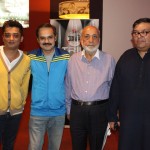All things happen for a good reason and when Fahad Mustafa could not become a dentist, he stumbled into acting. After being grilled by veteran producer Iqbal Ansari as a debutant, surviving the hostile attitude of his seniors and his first role with zero lines; in a span of just six years Fahad Mustafa has bagged key roles in two dozen serials, shone in title roles and now at age 26 runs his own production company.
Son of Sindhi character actor Salahuddin Tunio, this second generation actor had a legacy to carry forward and has done so with aplomb. With his looks and talent, Fahad has enough grit to give Bollywood actors Rahul Bose, Kunal Khemu, Sonu Sood and even Abhishek Bachchan a run for their money.
Aashti, Tair-i-Lahoti( unforgettable character of Pasha), Veena, Najiah, Thori Dur Saath Chalo, Thora Saath Chaliye, Malika, Yeh Zindagi Hai, Tum Jo Mile, Lahaasil, Wajood-i-laraib, Karwatein and Andata are some of his memorable serials, but Fahad feels he still has a long way to go.
“I won’t say that I have a tremendous amount of work because itna kaam nahin hai. Fortunately, whatever I have done has gotten noticed. When my lot came in that is Mikaal, Imran Abbas and me; we used to think that the more senior ones would fade away in a few years but they didn’t, so at least one thing is clear that they are not dying we are not dying, and that is a good thing.”
Farad’s first break was Sheeshay ka Mahal, a serial written by Nur ul Huda Shah, “The serial was a flop but my work was noticed. Nur Apa wasn’t too happy with me and preferred Mikaal who was conventionally good looking. Since I was studying and travelled in buses and also played cricket all day, I was tanned and didn’t look my best when she met me. But she approved when I auditioned for her. Maya Khan, Samina Peerzada and Maria Wasti were also in the cast and all three auditioned me. Since the role required crying; I cried in front of all of them. That serial didn’t go on air for a whole year due to some problems in the channel.”
For about 17 or 18 episodes in Sheeshay ka Mahal, Fahad had no lines at all. “Nur Apa had no faith in me. I just listened to other characters talk and nodded my head. I would get Rs2,000 per day and fortunately the shoots were slow so I made enough money to buy a car. After doing 20 episodes without uttering a single line, I finally gathered the courage to ask Nur apa for dialogues. She said ‘You don’t need lines because you are doing a lot even without speaking’.” Fahad took it as a compliment then.
“Then when Nur apa decided to write a soap for me, I overheard Samina Peerzada say ‘Yeh kal ka larka ab iss pe soap likha jayega’? Her comment came as a shock but later things changed, we worked together and when I met Samina apa she suggested we should work together. I think nobody has the right to judge anyone without giving them a chance to work.”
Fahad has a message for senior actors. “I cannot be compared to Talat Husain to Sajid Hasan. It would be pointless for someone in their position to be insecure about a junior actor like me. Even people who haven’t seen them work know who they are. I salute the energy of Qazi Wajid Sahib who says that his talent has not been tapped yet and there is a lot more potential in him yet. People are not tired of seeing him because he is not tired of himself yet. He is wonderful person to work with.”
At 25, Fahad became a producer and he talks like a seasoned actor in his 50s, “Maturity has nothing to do with age. In the last five years I have learnt a lot, met all sorts of people and now I seem to understand people a whole lot better.”
Boring scripts ultimately pushed him towards production, “When you see actors appearing with the same kind of look repeatedly and audiences get bored of their faces, it is not the actor’s fault at all as scripts are not written with juicy characters to give any leverage to actors.”
Fahad is producing two serials currently, “My production team has young people with big dreams. I use my own ideas and stories, my wife writes the plays. We wanted to do something for the Hum Tele Film Festival but I don’t agree with the concept of tele films. To me they happen when a frustrated director can’t get a film, is unable to make a play and ends up making a film for the mini screen. It is like mixing two mediums. If you want to make a film, then make a film.”
Fahad feels that people who don’t have opportunities here run to India. “When people go and work in India, they come back as misfits. At the end of the day we have to work with people here. When our actors experience Bollywood, they are not good enough to work there and the system here is no longer good enough for them. Even our worst actors are way better than Indian TV actors who are very professional but totally dependent on the director. We as actors have sharpened to the fact that jo bhi karna hai hum ne khud hi karna hai. I worked with Rati Agnihotri and she has done 700 films. Either they are really smart and pretend in front of us or else they are so robotic that they have everything fed to them by the director.”
Fahad prefers character roles to simple chocolate leads. “When I don’t have money I will look for anything. We can’t always choose but mostly I want something on the edge, something different every time. Veena was Atif Husain’s brainchild with a guest appearance by Fahad Mustafa who developed it into the title role. “In 20 episodes I had only 45 scenes because I thought the lesser I appear the more digestible I will be with the audiences. I also thought that as a main track people won’t like it.”
Veena was shot in interior Sindh at a mazar and to play a eunuch and dance in front of all those people was not easy for me.” Wasn’t playing a eunuch bad for his image? “What is my image? The mini screen is too small to have an image. I still meet women who think that I am a lowlife like Pasha in reality. A lot of people think I am Bhola and they ask me why I left the serial. I ask them what do they like about Bhola but they don’t have an answer.”
For him, Aashti was his filthiest role and also the best experience of his career. “I was so into my role of Shaheedul Islam that even after I went home I would be talking in Bangla undertones. I love being an actor because I’m constantly switching characters.”











It's excellent. carry on dude.